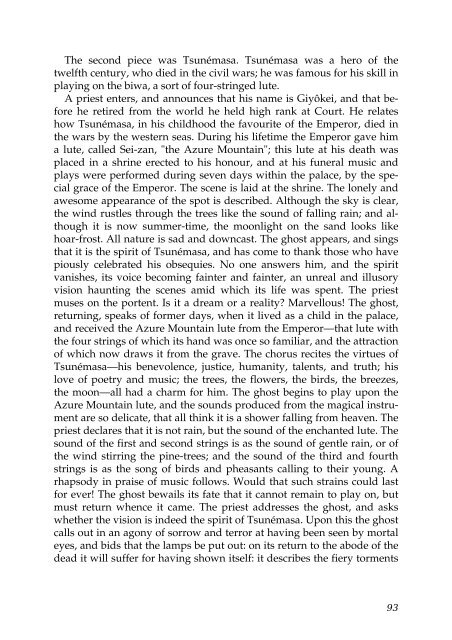You also want an ePaper? Increase the reach of your titles
YUMPU automatically turns print PDFs into web optimized ePapers that Google loves.
The second piece was Tsunémasa. Tsunémasa was a hero <strong>of</strong> the<br />
twelfth century, who died in the civil wars; he was famous for his skill in<br />
playing on the biwa, a sort <strong>of</strong> four-stringed lute.<br />
A priest enters, and announces that his name is Giyôkei, and that before<br />
he retired from the world he held high rank at Court. He relates<br />
how Tsunémasa, in his childhood the favourite <strong>of</strong> the Emperor, died in<br />
the wars by the western seas. During his lifetime the Emperor gave him<br />
a lute, called Sei-zan, "the Azure Mountain"; this lute at his death was<br />
placed in a shrine erected to his honour, and at his funeral music and<br />
plays were performed during seven days within the palace, by the special<br />
grace <strong>of</strong> the Emperor. The scene is laid at the shrine. The lonely and<br />
awesome appearance <strong>of</strong> the spot is described. Although the sky is clear,<br />
the wind rustles through the trees like the sound <strong>of</strong> falling rain; and although<br />
it is now summer-time, the moonlight on the sand looks like<br />
hoar-frost. All nature is sad and downcast. The ghost appears, and sings<br />
that it is the spirit <strong>of</strong> Tsunémasa, and has come to thank those who have<br />
piously celebrated his obsequies. No one answers him, and the spirit<br />
vanishes, its voice becoming fainter and fainter, an unreal and illusory<br />
vision haunting the scenes amid which its life was spent. The priest<br />
muses on the portent. Is it a dream or a reality? Marvellous! The ghost,<br />
returning, speaks <strong>of</strong> former days, when it lived as a child in the palace,<br />
and received the Azure Mountain lute from the Emperor—that lute with<br />
the four strings <strong>of</strong> which its hand was once so familiar, and the attraction<br />
<strong>of</strong> which now draws it from the grave. The chorus recites the virtues <strong>of</strong><br />
Tsunémasa—his benevolence, justice, humanity, talents, and truth; his<br />
love <strong>of</strong> poetry and music; the trees, the flowers, the birds, the breezes,<br />
the moon—all had a charm for him. The ghost begins to play upon the<br />
Azure Mountain lute, and the sounds produced from the magical instrument<br />
are so delicate, that all think it is a shower falling from heaven. The<br />
priest declares that it is not rain, but the sound <strong>of</strong> the enchanted lute. The<br />
sound <strong>of</strong> the first and second strings is as the sound <strong>of</strong> gentle rain, or <strong>of</strong><br />
the wind stirring the pine-trees; and the sound <strong>of</strong> the third and fourth<br />
strings is as the song <strong>of</strong> birds and pheasants calling to their young. A<br />
rhapsody in praise <strong>of</strong> music follows. Would that such strains could last<br />
for ever! The ghost bewails its fate that it cannot remain to play on, but<br />
must return whence it came. The priest addresses the ghost, and asks<br />
whether the vision is indeed the spirit <strong>of</strong> Tsunémasa. Upon this the ghost<br />
calls out in an agony <strong>of</strong> sorrow and terror at having been seen by mortal<br />
eyes, and bids that the lamps be put out: on its return to the abode <strong>of</strong> the<br />
dead it will suffer for having shown itself: it describes the fiery torments<br />
93



